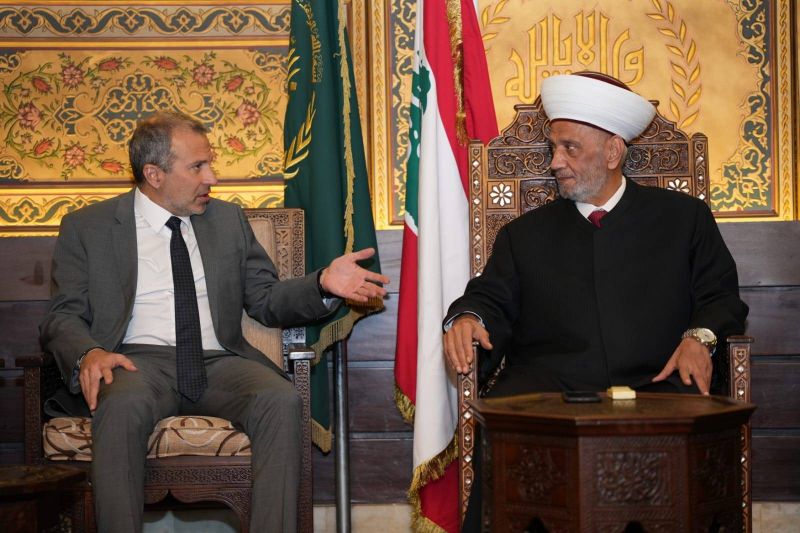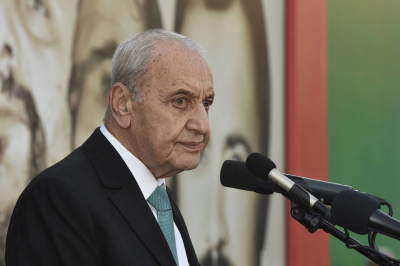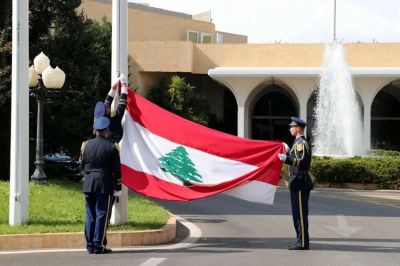
Gebran Bassil, the head of the Free Patriotic Movement, (left) at Dar al-Fatwa during a meeting with Grand Mufti Abdel-Latif Derian (right.) (Credit: Mohammed Yassin/L'Orient Today)
BEIRUT — The presidential vacuum in Lebanon can only be solved with “dialogue,” Gebran Bassil, the head of the Free Patriotic Movement, said from Dar al-Fatwa, the highest Sunni religious authority in the country, during a meeting with Grand Mufti Abdel-Latif Derian on Tuesday.
Earlier on Tuesday morning, Parliament Speaker Nabih Berri had said "I did my part; I proposed a dialogue initiative that they rejected," criticizing his opponents who refused the parliamentary dialogue initiative he proposed at the end of August.
“There is no solution to the issue of the presidency except through understanding and balanced partnership, and this of course requires dialogue,” Bassil said during the meeting. He later posted his comments on X, formerly Twitter.
“We have never been anything but in favor of dialogue, but we know that dialogue must be useful, and that is what we emphasized to [Derian] and agreed with him that dialogue has conditions.”
Bassil said that for a president to be elected in Lebanon “either there will be an understanding that leads to a consensual [president] or a broad approval of a presidential candidate, or in the event of no understanding, we should go to an open electoral session and let whoever wins become the upcoming president.”
Bassil affirms FPM’s ‘commitment to Taif’
“Preserving Taif requires its implementation, and this matter requires several things, including the abolition of sectarianism, including decentralization. We discussed with [Derian] the abolition of the view that it appears as if the demand for decentralization is for a group and serves Christians, because decentralization is a demand for all Lebanese.”
FPM delegates, along with FPM head Gebran Bassil visiting Abdel-Latif Derian. (Credit: Mohammed Yassin/L'Orient Today)
In recent months, the FPM has said that the party is ready to support any candidate for the presidency, including Marada leader Sleiman Frangieh (a political rival of the FPM and Hezbollah’s preferred future president], if Hezbollah and its camp commit to implementing two key measures: extensive administrative and financial decentralization, and a trust fund to manage state assets.
While decentralization has long been one of the FPM’s key demands, the fund is a new addition to its vocabulary. “We are suggesting the establishment of a trust fund to improve the management of state assets and make life easier for Lebanese,” FPM MP Caesar Abi Khalil, who is helping to draft a bill along these lines, previously told L’Orient-Le Jour.
The fund, which would be run by an “independent board of directors,” would be responsible for overseeing its assets in partnership with the private sector, which could take on the management of these companies or buy shares and become owners.
Bassil noted that Lebanon also needs to carry out reforms in the country so that countries, companies and individuals who are interested in investing in Lebanon can do so. “We don’t mind who the country or investor is, we only care about the best interest of the country,” he said.
In mid-September, the International Monetary Fund (IMF) once again criticized the "lack of action" by Lebanese authorities on "urgently needed reforms" to the economy that would unlock a multibillion-dollar aid package.
Speaking on the issue of the smuggling of Syrians across the border to Lebanon, Bassil noted that the FPM is against it “out of concern for all the Lebanese, and what is happening can be stopped through the Lebanese [security] agencies who know very well how to close the crossings [used by smugglers].”
Illegal migration poses an “existential danger” to Lebanon, army commander Joseph Aoun told the caretaker cabinet on Sept. 11. According to Aoun, over 26,000 Syrians have illegally crossed the border since the beginning of the year.
To curb illegal migration, the Lebanese Army has deployed patrols along the border in recent months and regularly announces the number of illegal migrants it sends back to Syria.
“On average, 400 people try to cross the border every day,” army spokesman Gen. Elie Mezher told L’Orient-Le Jour.

